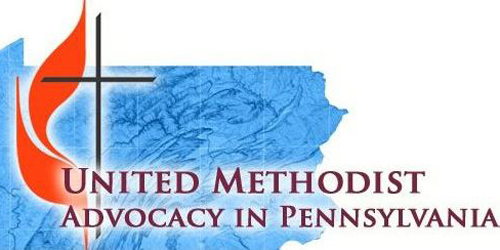

The Rev. Dai Morgan, legislative advocate for our three Pennsylvania annual conferences, reports monthly on his activities and key state and federal political issues and actions (and in some cases, inaction) of concern to United Methodists. His June 2017 Advocacy Report, available on our website highlights actions and strategies around human trafficking, gerrymandering voting districts, opposition to proposed health care legislation and many other issues.
Morgan’s lengthy reports offer brief but informative and often insightful views of many legislative topics. They can stimulate one’s interest in taking responsive action on selected causes. And they always provide interesting reading—not meant to be read in full at one time perhaps, but over days and weeks, with a focus on topics of special interest.
Morgan, who lives in Pittsburgh and briefly addressed our Annual Conference in June, is eager to talk to churches in person about his work and about issues that are or should be of concern to them. He wants to help them become engaged in statewide social action. Contact him at daimorgan@comcast.net. You can also communicate with him and others via the UM Advocacy in Pennsylvania Facebook page.
Accompanying Morgan’s June report is his SB554 “Human Trafficking” Letter, urging PA House Judiciary Committee members to move the “Safe Harbor in Human Trafficking” bill out of committee to be considered by the whole chamber. He cites a letter supporting the bill by all three UM bishops in Pennsylvania sent over a year ago. It calls for developing statewide protocols to provide services and protection for child victims of human trafficking and making provisions for funding, law enforcement training and public awareness in support of this effort.
“We do not believe that children trapped in human trafficking are criminals,” read the bishops’ letter, which Morgan reiterates. “Placing them in the juvenile justice system is inappropriate. This results in re-victimization. We support the bill’s intention to place such children in the care of the Department of Human Services.”
SB554 passed unanimously in the Senate on April 25 and now only needs the House to be allowed to consider and vote on it also.
Be sure to read our advocate’s numerous legislative status and advocacy summaries in his fascinating report. Here is a partial list of further abridged summaries, but Morgan provides more vital details for these topics and others in his full June 2017 Advocacy Report:
- Natural gas industry expansion: A “Stop the Madness” rally protested expansion of fracking and the legislature refusal to tax the natural gas industry.
- Health Care Legislation: Ardent UM’s opposed the GOP’s proposed federal legislation with a prayer vigil June 25-26 at U.S. Sen. Pat Toomey’s Harrisburg and Washington DC
- The Dream Care Initiative: An effort to get an estimated 24,000 undocumented children in PA covered by CHIP (Children’s Health Insurance Program). All three PA annual conferences officially support this initiative.
- Gender Parity: Pennsylvania has the second-lowest grade, just above Mississippi, in its representation of women in elected office, based on the Gender Parity Index (GPI). Our “F” grade is attributed largely to a lack of women in federal leadership roles, including none in the state’s Congressional delegation and not one female U.S. senator Pennsylvania’s history.
- Police Videos: With passage of SB560, PA will soon exempt police audio and video recordings from the public-record and give law enforcement agencies broad discretion over when to refuse requests for copies. It removes police body camera and dash camera recordings from the Right to Know Law and imposes a cumbersome process that will make it very difficult for the public to gain access to these recordings. The new law also would permit officers to not advise people that they are being recorded.
- Reduced Sentences = Reduced Costs: Wolf’s administration learned they can save $100 million from the state’s bloated budget over time by reducing the sentences of some non-violent offenders, by five months. A Justice Reinvestment report estimates 1,032 fewer inmates by 2022-23, saving the state $108 million. But the House this year passed a bill to increase prison time for some drug and violent crime offenders. That bill, now in the Senate, would drive up taxpayer costs by $85 million annually and increase the prison population by 2,200 inmates, reversing a six-year decline.
- Climate Change: A popular new resolution urges Pennsylvania to join other states in the U.S. Climate Alliance, which is committed to reducing greenhouse gas emissions significantly and meeting or exceeding the goals of the federal Clean Power Plan. The alliance was formed in response to President Donald Trump’s recent decision to withdraw the U.S. from the Paris Climate Agreement.
- Gerrymandering Lawsuit: On June 15, a lawsuit was filed in Pennsylvania’s Commonwealth Court, contending that the map of the state’s 18 congressional districts is unconstitutional because it was created through partisan gerrymandering. The districts favor Republicans and violate the rights of Democratic majority voters. The suit asks the court to throw out the map, prevent its use in the 2018 election and order the creation of a new map that complies with the constitution. (All three PA annual conference recently approved resolutions advocating for procedural changes.) The lawsuit calls partisan gerrymandering “one of the greatest threats to American democracy today” and contends that Pennsylvania’s district map is one of the worst partisan gerrymanders in the country.
- Animal Cruelty: Legislation designed to curb animal cruelty went to Gov. Tom Wolf for his expected signature in late June. “Libre’s Law,” named for a formerly abused and neglected Boston Terrier, overhauls the state’s animal abuse statutes, making five major changes including increased penalties for animal abuse.
- Marijuana Grower an Dispensary Permits: The state’s Health Department awarded permits to 12 applicants in six regions to grow and process medical marijuana and issued 27 permits to businesses in six regions to sell medical marijuana to patients.
- Sanctuary Municipalities: Bills have been offered to penalize PA cities for allowing sanctuary residence to undocumented immigrants and not requiring local police to cooperate fully with federal Immigration and Customs Enforcement officers. So-called “sanctuary cities” like Philadelphia contend that they are following the rules and trying to protect immigrants from fear and harassment that could hamper their ability and willingness to cooperate with local law enforcement to prevent and solve crimes.
- Experimental Treatments for the Terminally-Ill: A PA Right-to-Try bill, passed by the House, has been amended and awaits likely approval in the Senate. It would allow a manufacturer of an investigational drug, biological product or device to make an unapproved product available to terminally-ill patients. Likewise, it would allow terminally-ill patients to request a non-approved product.
- A Budget for a new year: On June 30, the last day of the fiscal year, the state General Assembly adopted a bipartisan spending plan for the 2017-18 state budget. The plan provides hundreds of millions of dollars more for education (at all levels), pension obligations and services for the intellectually disabled, but demands belt-tightening across state government agencies and in Medicaid. It also depends on savings from a shrinking prisons population. A complete government budget consists of three elements: a spending bill (General Appropriations), revenue bills and code bills (Public School, Administration, Welfare, Fiscal). The state constitution requires a balanced budget and the governor and legislators must still identify more revenue sources to result in a balanced budget.
